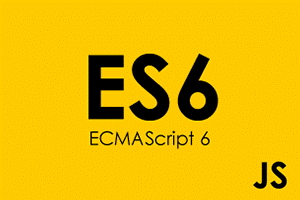JavaScript new Features

ECMAScript, ECMA, and JavaScript
ECMA: An Organization that creates standards for scripting languages
ECMAScript: provides the rules, details, and guidelines that a scripting language must observe to be considered ECMAScript compliant.
JavaScript: Scripting language that conforms to the ECMAScript specification.
JavaScript Engines and Babel
JavaScript Engines: A program or interpreter that understands and executes JavaScript code. Like V8 in Chrome, SpiderMonkey in Firefox, and Chakra in Edge. Bebel: A transpiler that can convert ES6 code to ES5 code.
ES6 and ES Process
ES6: It is the sixth edition of the ECMA standard, and features major changes and improvements to the ECMAScript specification.
ES Process: Each proposal for an ECMAScript feature goes through the following maturity stages.
Stage 0: strawman, Stage 1: proposal, Stage 2: draft, Stage 3: candidate and Stage 4: finished.
Top ES6 Features
Default Parameters
ES5
ES6
var link = function (height, color, url) {
var height = height || 50
var color = color || 'red'
var url = url || 'http://azat.co'
...
}var link = function(height = 50, color = 'red', url = 'http://azat.co') {
...
}Template Literals
ES5
ES6
var name = 'Your name is ' + first + ' ' + last + '.'
var url = 'http://localhost:3000/api/messages/' + idvar name = `Your name is ${first} ${last}.`
var url = `http://localhost:3000/api/messages/${id}`Multi-line Strings
ES5
ES6
var roadPoem = 'Then took the other, as just as fair,\n\t'
+ 'And having perhaps the better claim\n\t'
+ 'Because it was grassy and wanted wear,\n\t'
+ 'Though as for that the passing there\n\t'
+ 'Had worn them really about the same,\n\t'
var fourAgreements = 'You have the right to be you.\n\
You can only be you when you do your best.'var roadPoem = `Then took the other, as just as fair,
And having perhaps the better claim
Because it was grassy and wanted wear,
Though as for that the passing there
Had worn them really about the same,`
var fourAgreements = `You have the right to be you.
You can only be you when you do your best.`Destructuring Assignment
ES5
ES6
var jsonMiddleware = require('body-parser').json
var body = req.body, // body has username and password
username = body.username,
password = body.password var {json: jsonMiddleware} = require('body-parser')
var {username, password} = req.body
// This also works with arrays
var [col1, col2] = $('.column'),
[line1, line2, line3, , line5] = file.split('\n')
// Nested
var metadata = {
title: "Scratchpad",
translations: [
{
url: "/de/docs/Tools/Scratchpad",
title: "JavaScript-Umgebung"
}
],
url: "/en-US/docs/Tools/Scratchpad"
};
var { title: englishTitle, translations: [{ title: localeTitle }] } = metadata
console.log(englishTitle) // "Scratchpad"
console.log(localeTitle) // "JavaScript-Umgebung"
// This is valid for function parameters
var link = function({name='joni', lastName='delValle'}) {
...
}Enhanced Object Literals
ES5
ES6
var getAccounts = function(){return [1,2,3]}
var accountServiceES5 = {
getAccounts: getAccounts,
toString: function() {
return JSON.stringify()
},
valueOf_1_2_3: getAccounts()
}var getAccounts = function(){return [1,2,3]}
var accountServiceES5 = {
getAccounts
toString() {
return JSON.stringify()
},
[ 'valueOf_' + getAccounts().join('_') ]: getAccounts()
}Arrow Functions
ES5
ES6
var _this = this
$('.btn').click(function(event){
return _this.sendData()
})
var ids = ['5632953c4e345e145fdf2df8','563295464e345e145fdf2df9']
var messages = ids.map(function (value) {
return "ID is " + value // explicit return
})
$('.btn').click((event) => {
return this.sendData()
})
var ids = ['5632953c4e345e145fdf2df8','563295464e345e145fdf2df9']
var messages = ids.map(value => `ID is ${value}`) // implicit returnPromises, before: q, bluebird, etc.
ES5
ES6
setTimeout(function(){
console.log('Yay!')
}, 1000)
var wait1000 = new Promise(function(resolve, reject) {
setTimeout(resolve, 1000)
}).then(function() {
console.log('Yay!')
})Constructs Let and Const
ES5
ES6
function nodeSimplified(){
var a =10
console.log(a) // output 10
if(true){
var a=20
console.log(a) // output 20
}
console.log(a) // output 20
}
function nodeSimplified(){
const MY_VARIABLE =10
console.log(MY_VARIABLE) //output 10
}function nodeSimplified(){
let a =10
console.log(a) // output 10
if(true){
let a=20
console.log(a) // output 20
}
console.log(a) // output 10
}
function nodeSimplified(){
const MY_VARIABLE =10
console.log(MY_VARIABLE) //output 10
MY_VARIABLE =20 //throws type error
console.log(MY_VARIABLE) }Classes
ES5
ES6
function Bunny(name, age, favoriteFood) {
this.name = name
this.age = age
this.favoriteFood = favoriteFood
}
Bunny.prototype.eatFavFood = function () {
console.log('\"Mmmm! Those '+this.favoriteFood+' were delicious\", said '+this.name+', the '+this.age+' year old bunny.')
};
var newBunny = new Bunny('Brigadier Fluffkins', 3, 'Raspberry Leaves')
newBunny.eatFavFood();
// "Mmmm! Those Raspberry Leaves were delicious", said Brigadier Fluffkins, the 3 year old bunny.class Bunny {
constructor(name, age, favoriteFood){
this.name = name
this.age = age
this.favoriteFood = favoriteFood
}
eatFavFood() {
console.log(`"Mmmm! Those ${this.favoriteFood} were delicious", said ${this.name} the ${this.age} year old bunny.`)
};
}
let es6Bunny = new Bunny('Brigadier Fluffkins', 3, 'Raspberry Leaves')
es6Bunny.eatFavFood()
// "Mmmm! Those Raspberry Leaves were delicious", said Brigadier Fluffkins the 3 year old bunny.
Extending Objects
ES5
ES6
// Underscore
var o1 = { a: 1 };
var o2 = { b: 2 };
// clone
var copy = _.extend({}, o1);
// merge
var obj = _.extend(o1, o2); var o1 = { a: 1 }
var o2 = { b: 2 }
// clone
var copy = Object.assign({}, o1)
// merge
var obj = Object.assign(o1, o2)
// Using Spread Operator
var copy = { ...o1 }
var obj = { ...o1, ...o2 }
let { x, y, ...z } = { x: 1, y: 2, a: 3, b: 4 }
x; // 1
y; // 2
z; // { a: 3, b: 4 }Modules
ES5
ES6
var scoreboard = function() {
var message = 'Welcome to the game!';
function printMessage() {
console.log(message);
}
function updateMessage(newMessage) {
message = newMessage;
}
//return an object that represents our new module
return {
showMessage: printMessage,
updateMessage: updateMessage
}
}(); //← This is called a immediately invoked function definition, or IIFE
// In another file
scoreboard.printMessage();
scoreboard.updateMessage(“Let the game begin!”);function printMessage() { console.log(message) }
function updateMessage(newMessage) { message = newMessage }
export { printMessage, updateMessage }
// In another file
import * as message from ‘./message.js’
message.printMessage()